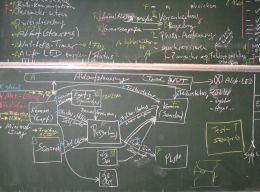Jump to: How to study,
Courses
 The courses and jobs offered by our working group allow students to start as a beginner and to finish with experiences needed to work as an employee in industry or research. There are several ways to do so, either with an emphasis on theory or on practical work, or both. Different demonstrators and robots are used as early as possible in order to give a concrete feeling of what is needed in practical applications. To foster practically relevant experiences further, many courses are conducted by a team of students. Students may also participate at concrete projects which are conducted for research purposes or together with industrial partners for the same reason. This may be done either in form of bachelor, master or PhD theses or as a student assistant (jobs).
The courses and jobs offered by our working group allow students to start as a beginner and to finish with experiences needed to work as an employee in industry or research. There are several ways to do so, either with an emphasis on theory or on practical work, or both. Different demonstrators and robots are used as early as possible in order to give a concrete feeling of what is needed in practical applications. To foster practically relevant experiences further, many courses are conducted by a team of students. Students may also participate at concrete projects which are conducted for research purposes or together with industrial partners for the same reason. This may be done either in form of bachelor, master or PhD theses or as a student assistant (jobs).
The knowledge gained by that is important for many prosperous industrial areas searching for young employees combing software experience with technical understanding. To name a few: automotive systems, avionics, and automation systems in general, but also research and consulting. Former students of our working group are hence now working as research assistants, as software designers for embedded systems and for testing of automotive software or as a consultant.
How to study:
The normal way students start their contact to our working group are the lecture and exercise in Informatik C - Grundlagen der Technischen Informatik (Logic and Computer Design Fundamentals). It is compulsory for computer science students and optional for many other students. It can be followed by the Hardware-Praktikum (Hardware Lab) which consists of two parts. First, some main aspects of implementing digital logic are addressed by concrete exercises spanning from gate level and programmable logic devices to assembly programming on a real microcontroller. The second phase is run as a short project and covers the design and implementation of a small, but typical embedded system. It puts a first emphasis on working on a project and in a team. This is very important for us in order to give the students practically relevant experiences as early as possible, i.e. the fourth semester.
 Several follow-up courses allow getting deeper into computational intelligence methods (Fuzzy-Systems und Fuzzy-Control), broadening the knowledge in embedded systems design (Grundlagen mechatronischer Systeme - Mechatronic Systems Fundamentals) or to get a deeper understanding of how modern digital systems are implemented (Entwurf digitaler Systeme - Digital Systems Design) and how a computer works (Rechnerentwurf - Computer Design).
Several follow-up courses allow getting deeper into computational intelligence methods (Fuzzy-Systems und Fuzzy-Control), broadening the knowledge in embedded systems design (Grundlagen mechatronischer Systeme - Mechatronic Systems Fundamentals) or to get a deeper understanding of how modern digital systems are implemented (Entwurf digitaler Systeme - Digital Systems Design) and how a computer works (Rechnerentwurf - Computer Design).
Seminars pick up current research topics and are a good starting point for finding a hot topic for a bachelor or master thesis or for taking a student job at our working group. The same holds for other practical courses like the Systemdesign-Praktikum (Systems Design Lab) or project groups. These are conducted in form of a more challenging project by a team in order to further emphasize team work and project skills.